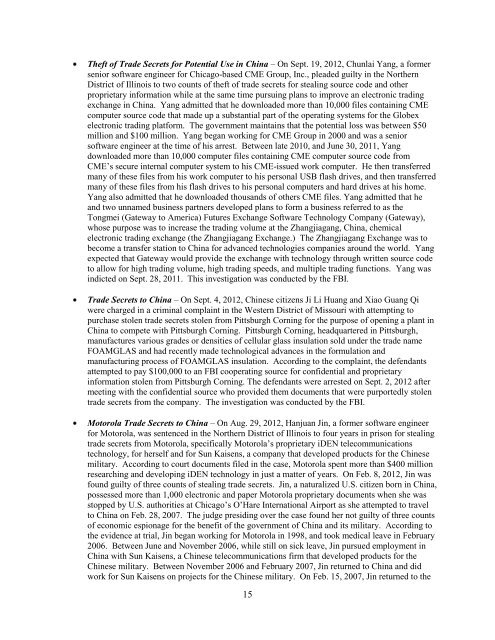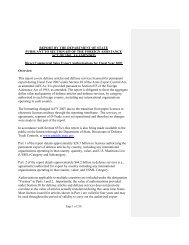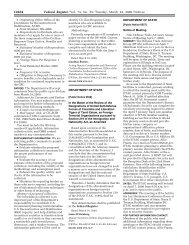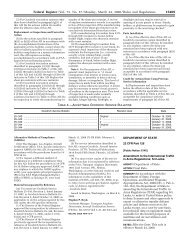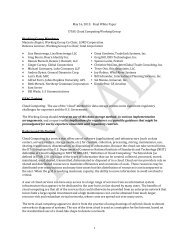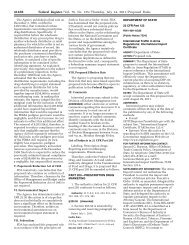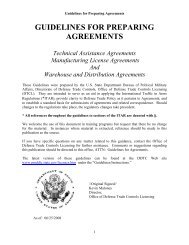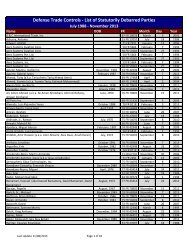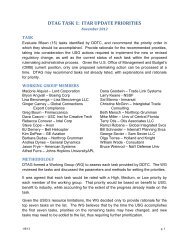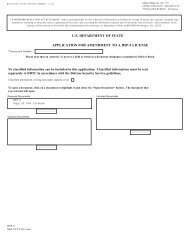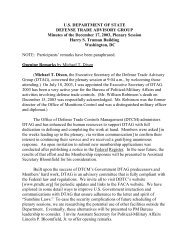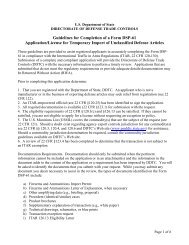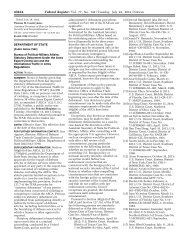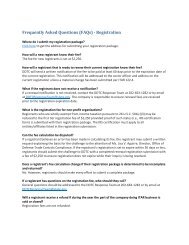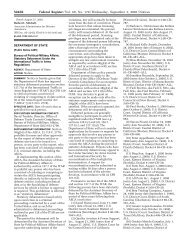Major Export Enforcement Cases - Directorate of Defense Trade ...
Major Export Enforcement Cases - Directorate of Defense Trade ...
Major Export Enforcement Cases - Directorate of Defense Trade ...
Create successful ePaper yourself
Turn your PDF publications into a flip-book with our unique Google optimized e-Paper software.
Theft <strong>of</strong> <strong>Trade</strong> Secrets for Potential Use in China – On Sept. 19, 2012, Chunlai Yang, a former<br />
senior s<strong>of</strong>tware engineer for Chicago-based CME Group, Inc., pleaded guilty in the Northern<br />
District <strong>of</strong> Illinois to two counts <strong>of</strong> theft <strong>of</strong> trade secrets for stealing source code and other<br />
proprietary information while at the same time pursuing plans to improve an electronic trading<br />
exchange in China. Yang admitted that he downloaded more than 10,000 files containing CME<br />
computer source code that made up a substantial part <strong>of</strong> the operating systems for the Globex<br />
electronic trading platform. The government maintains that the potential loss was between $50<br />
million and $100 million. Yang began working for CME Group in 2000 and was a senior<br />
s<strong>of</strong>tware engineer at the time <strong>of</strong> his arrest. Between late 2010, and June 30, 2011, Yang<br />
downloaded more than 10,000 computer files containing CME computer source code from<br />
CME’s secure internal computer system to his CME-issued work computer. He then transferred<br />
many <strong>of</strong> these files from his work computer to his personal USB flash drives, and then transferred<br />
many <strong>of</strong> these files from his flash drives to his personal computers and hard drives at his home.<br />
Yang also admitted that he downloaded thousands <strong>of</strong> others CME files. Yang admitted that he<br />
and two unnamed business partners developed plans to form a business referred to as the<br />
Tongmei (Gateway to America) Futures Exchange S<strong>of</strong>tware Technology Company (Gateway),<br />
whose purpose was to increase the trading volume at the Zhangjiagang, China, chemical<br />
electronic trading exchange (the Zhangjiagang Exchange.) The Zhangjiagang Exchange was to<br />
become a transfer station to China for advanced technologies companies around the world. Yang<br />
expected that Gateway would provide the exchange with technology through written source code<br />
to allow for high trading volume, high trading speeds, and multiple trading functions. Yang was<br />
indicted on Sept. 28, 2011. This investigation was conducted by the FBI.<br />
<strong>Trade</strong> Secrets to China – On Sept. 4, 2012, Chinese citizens Ji Li Huang and Xiao Guang Qi<br />
were charged in a criminal complaint in the Western District <strong>of</strong> Missouri with attempting to<br />
purchase stolen trade secrets stolen from Pittsburgh Corning for the purpose <strong>of</strong> opening a plant in<br />
China to compete with Pittsburgh Corning. Pittsburgh Corning, headquartered in Pittsburgh,<br />
manufactures various grades or densities <strong>of</strong> cellular glass insulation sold under the trade name<br />
FOAMGLAS and had recently made technological advances in the formulation and<br />
manufacturing process <strong>of</strong> FOAMGLAS insulation. According to the complaint, the defendants<br />
attempted to pay $100,000 to an FBI cooperating source for confidential and proprietary<br />
information stolen from Pittsburgh Corning. The defendants were arrested on Sept. 2, 2012 after<br />
meeting with the confidential source who provided them documents that were purportedly stolen<br />
trade secrets from the company. The investigation was conducted by the FBI.<br />
Motorola <strong>Trade</strong> Secrets to China – On Aug. 29, 2012, Hanjuan Jin, a former s<strong>of</strong>tware engineer<br />
for Motorola, was sentenced in the Northern District <strong>of</strong> Illinois to four years in prison for stealing<br />
trade secrets from Motorola, specifically Motorola’s proprietary iDEN telecommunications<br />
technology, for herself and for Sun Kaisens, a company that developed products for the Chinese<br />
military. According to court documents filed in the case, Motorola spent more than $400 million<br />
researching and developing iDEN technology in just a matter <strong>of</strong> years. On Feb. 8, 2012, Jin was<br />
found guilty <strong>of</strong> three counts <strong>of</strong> stealing trade secrets. Jin, a naturalized U.S. citizen born in China,<br />
possessed more than 1,000 electronic and paper Motorola proprietary documents when she was<br />
stopped by U.S. authorities at Chicago’s O’Hare International Airport as she attempted to travel<br />
to China on Feb. 28, 2007. The judge presiding over the case found her not guilty <strong>of</strong> three counts<br />
<strong>of</strong> economic espionage for the benefit <strong>of</strong> the government <strong>of</strong> China and its military. According to<br />
the evidence at trial, Jin began working for Motorola in 1998, and took medical leave in February<br />
2006. Between June and November 2006, while still on sick leave, Jin pursued employment in<br />
China with Sun Kaisens, a Chinese telecommunications firm that developed products for the<br />
Chinese military. Between November 2006 and February 2007, Jin returned to China and did<br />
work for Sun Kaisens on projects for the Chinese military. On Feb. 15, 2007, Jin returned to the<br />
15


